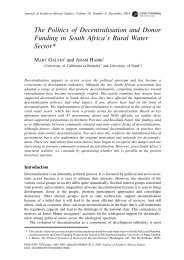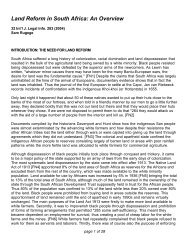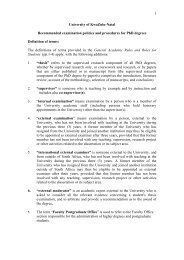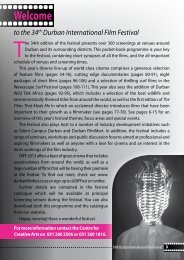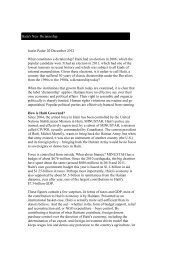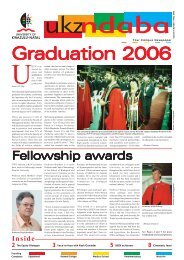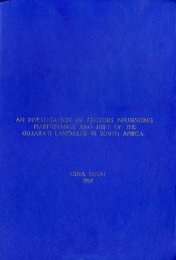universit y of kw azulu-na tal research repor t 2008/2009 - UKZN ...
universit y of kw azulu-na tal research repor t 2008/2009 - UKZN ...
universit y of kw azulu-na tal research repor t 2008/2009 - UKZN ...
- No tags were found...
Create successful ePaper yourself
Turn your PDF publications into a flip-book with our unique Google optimized e-Paper software.
RESEARCH FOCUS AREASRESEARCH FOCUS AREAS❉ The Discipline <strong>of</strong> Biochemistry (Westville) in the School <strong>of</strong>❉ The Discipline <strong>of</strong> Microbiology (Westville) is undertaking a six-yearBiochemistry, Genetics, and Microbiology investigates the use <strong>of</strong>collaborative <strong>research</strong> project involving the “impact <strong>of</strong> irrigation<strong>na</strong>notechnology in foreign gene delivery (classical gene therapy),water quality on the safety <strong>of</strong> fresh fruits and vegetables”.expression and gene silencing mediated by RNA interference. TheDiscipline has a dedicated cell/tissue culture facility. The Discipline❉ The Discipline <strong>of</strong> Microbiology (Westville) also investigatesalso focuses on yeast biotechnology, bi<strong>of</strong>uel production, andbioremediation <strong>of</strong> water co-contami<strong>na</strong>ted with chlori<strong>na</strong>ted organicbiomarkers <strong>of</strong> me<strong>tal</strong> pollution.compound and heavy me<strong>tal</strong>s and pr<strong>of</strong>iling the microbial populatio<strong>na</strong>nd diversity involved in the degradation process. The presence❉ The Discipline <strong>of</strong> Genetics in the School <strong>of</strong> Biochemistry, Genetics<strong>of</strong> both hydrolytic and reductive dehaloge<strong>na</strong>ses (involved in theand Microbiology focuses on the genetics <strong>of</strong> animals. Quantitative,degradation <strong>of</strong> chlori<strong>na</strong>ted hydrocarbons) were identified in samplespopulation and molecular genetics technologies are employedcollected from a hydrocarbon contami<strong>na</strong>ted site. This findingin unveiling the contribution that genes make to important traitsprovided strong evidence that bacteria capable <strong>of</strong> dehaloge<strong>na</strong>tionin animals. Molecular techniques are used to examine genetic<strong>of</strong> chlori<strong>na</strong>ted hydrocarbons may colonise contami<strong>na</strong>ted sitesfactors underpinning biological diversity in the field <strong>of</strong> Evolutio<strong>na</strong>rywithout introduction and this is particularly important from theBiology. In the field redox systems biology, the <strong>research</strong> focus isviewpoints <strong>of</strong> toxicology and bioremediation. In addition, the to<strong>tal</strong>on elucidating how the components in biological systems areDNA (metagenome) isolated from the contami<strong>na</strong>ted site wasintegrated to give functio<strong>na</strong>l properties.sequenced by pyrosequencing. The sequence data providedinsights into the metabolic functioning <strong>of</strong> the microbial population in❉ The Discipline <strong>of</strong> Microbiology (Westville) conducts <strong>research</strong>the metagenome.on improving beer quality, such as pr<strong>of</strong>iling flavour active estermalarial drugs which can be used to track malaria drugs in a rangecompounds in beer under different fermentation and nutritio<strong>na</strong>lA comparison <strong>of</strong> protein expressions <strong>of</strong> Acinetobacter calcoaceticusby Pr<strong>of</strong>essor Cristi<strong>na</strong> Trois. Its primary objective is to establish a<strong>of</strong> cells, tissues and body fluids. To understand how the diseaseconditions. The Discipline also focuses on extremophiles for theisolates LT1A and V2 during hydrocarbon degradation is also beingmultidiscipli<strong>na</strong>ry Renewable Energy Technology Centre whichaffects cells <strong>of</strong> the immune system during a malaria infection andisolation and identification <strong>of</strong> enzymes for use in the various industriesstudied.will: promote excellence in sustai<strong>na</strong>ble energy <strong>research</strong> andunder the influence <strong>of</strong> anti-malarial drug therapy, they employ X-Raysuch as paper and pulp and use as household detergents.technological development; foster scholarship and skills transfer;microa<strong>na</strong>lysis. X-Ray microa<strong>na</strong>lysis e<strong>na</strong>bles the measurement <strong>of</strong>Research is also carried out on biochemical and molecularand create and dissemi<strong>na</strong>te knowledge on renewable energy.minute changes in the concentrations <strong>of</strong> elements within individualBi<strong>of</strong>uels: biomining for novel, thermophilic enzymes forcharacterisation <strong>of</strong> bacteria isolated from wastewater treatmentOne <strong>of</strong> the main components <strong>of</strong> the project will be the developmentcells.The team has identified a malaria protein which has promisinglignocelluloses metabolism. Cloning in heterologous hosts, enzymeplant for chlorophenol degradation. Studies conducted focus on<strong>of</strong> short courses and modules for Masters students which will focusvaccine potential. The expression, location and structure <strong>of</strong> thecharacterisation. Construction <strong>of</strong> lignocelluloses-metabolisingthe genomic evolution and adaptation <strong>of</strong> phenol-degrading bacteriaon renewable energy and the different technologies associated withprotein are being studied.and ethanol fermenting strains. Construction <strong>of</strong> consortia forto lethal phenol concentrations. A virus evaluation programme <strong>of</strong>it. There will also be a strong emphasis on <strong>research</strong> and a team <strong>of</strong>lignocelluloses bioconversion to ethanol.the Umgeni River in Durban is being carried out, as well as me<strong>tal</strong>MSc and PhD students will be involved in related topics.❉ The Trypanosomiasis Laboratory within the School <strong>of</strong> Biochemistry,corrosion prevention by bio-competitive exclusion. Studies into theGenetics, and Microbiology (Pietermaritzburg) focuses on poultryBiopulping: Assessment <strong>of</strong> seaso<strong>na</strong>l micr<strong>of</strong>lora variation andgeneration and on-site treatment <strong>of</strong> synthetic greywater for non-The I-REAP initiative plans to develop a full-scale commercially-pathogens and trypanosomes <strong>of</strong> importance in South Africa and thetheir physical and chemical effects on wood chips for the pulpingpotable application are also carried out by the Discipline.operated pilot project for the production <strong>of</strong> energy viathe a<strong>na</strong>erobicrest <strong>of</strong> Africa to develop diagnostic assays, therapeutic strategiesindustry.digestion <strong>of</strong> organic biomass, particularly agricultural waste. Theand ultimately vaccines against the diseases caused by these❉ Soil microbial response to climate changes and the implications onultimate aim <strong>of</strong> this Programme will be to make biogas-to-energy frominfectious agents. The <strong>research</strong> focuses on the molecules involvedEnzymes for industrial applications: Biomining <strong>of</strong> enzymescarbon-cycle feedbacks are being investigated by the Discipline <strong>of</strong>waste commercially viable in South Africa by introducing/developingin the binding <strong>of</strong> the pathogens to their host tissues, antigenicfrom extreme environments for application in renewable energyMicrobiology (Westville).appropriate technology. It will receive funding from the Natio<strong>na</strong>ldifferences between different strains <strong>of</strong> pathogens and betweenproduction (bi<strong>of</strong>uels) and biopulping. Gene and protein engineeringResearch Foundation’s Technology and Human Resources Programmethose <strong>of</strong> field strains and vaccine strains. Techniques in proteinto improve enzyme stability and activity. Creation <strong>of</strong> recombi<strong>na</strong>nt❉ The Integrated Renewable Energy Application Programme(THRIP) and the Industrial Development Corporation (IDC).purification and characterisation, immunochemistry and molecularstrains and consortia to degrade plant biomass and produce(I-REAP) is a collaborative endeavour between Karebo Powerbiology are employed.ethanol and pulp.Projects Pty Ltd and the University <strong>of</strong> KwaZulu-Na<strong>tal</strong> and is headed26 <strong>UKZN</strong> Research Report // <strong>2008</strong>/<strong>2009</strong> <strong>UKZN</strong> Research Report // <strong>2008</strong>/<strong>2009</strong> 27




